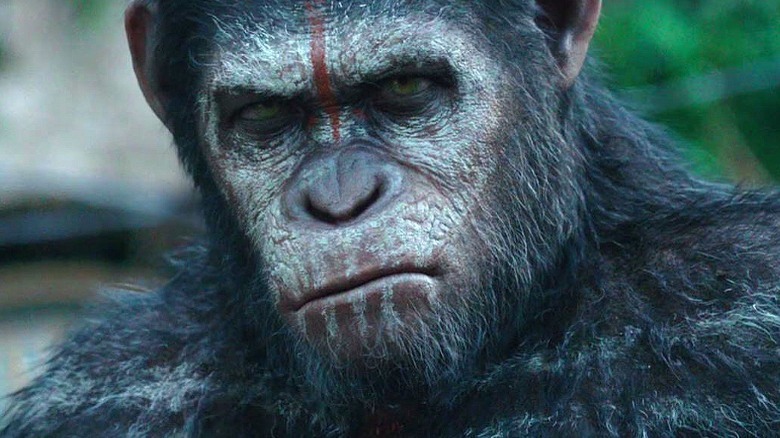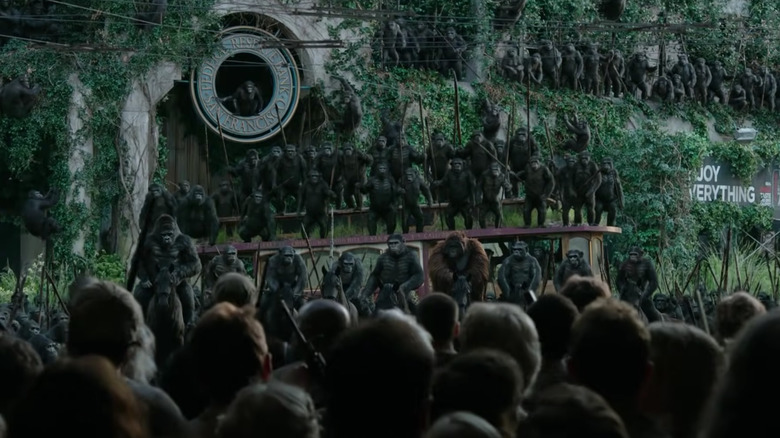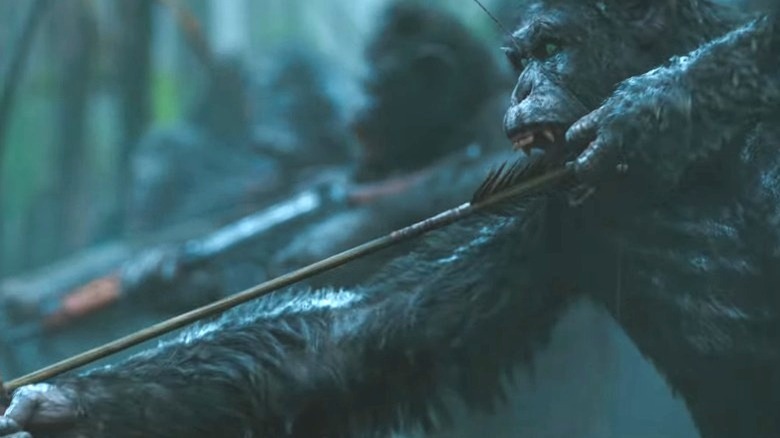The Ape Bootcamp Actors Had To Go Through For Dawn Of The Planet Of The Apes
When it comes to film trilogies, it's hard to find a series that comes even close to what 20th Century Studios did with the rebooted "Planet of the Apes" franchise. With a Rotten Tomatoes reputation through the roof and countless fans across the globe — both of the movies and director Matt Reeves, who helmed the second and third installments — it appears the studio may have given us the best trilogy of the 2010s with the "Apes" flicks. Not only did the films win audiences and critics over, but they also marked a pivotal time in the world of special effects and CGI. In order to get the best shots for each of the three movies, the filmmakers reportedly chose to thrust the ape acting team into a full-fledged "Ape Camp," aka boot camp, before every installment (via New York Post).
"We take it very seriously," said actor and movement choreographer Terry Notary, who's been at the helm of the "Ape Camps" for all three movies, in a 2017 interview with The Post. With no ape suits, makeup, or wigs to disguise them, people on the "Planet of the Apes" acting teams were forced to use their imaginations and motion-capture technology to portray the franchise's titular stars successfully. And it was ultimately the second film, "Dawn of the Planet of the Apes," where Notary's training was really put to the test.
Actors spent roughly a month at 'Ape Camp' before filming Dawn of the Planet of the Apes
According to franchise star Andy Serkis, actors and stunt guys working on "Dawn of the Planet of the Apes" spent about a month training before filming began in order to find their inner apes. The "Ape Camps" were held on location in Vancouver, Canada, with Terry Notary leading the way.
"We had an ape bootcamp or an ape-camp," Serkis said in 2014 while promoting "Dawn." He noted how the language of the apes "had to be found" by those working on the 2014 sequel, as well as the other two films. "Terry Notary, who is the performance coach — who also plays Rocket ... Caesar's right hand — he was responsible for teaching all of the actors, and stunt guys, and parkour experts who became the ape community, the ways of being, the ways of behaving as a chimpanzee or a gorilla or an orangutan," Serkis said. Describing how the "Planet of the Apes" production team was tasked with evolving in the same way the animals acted and communicated over the years, Serkis said multiple forms of expression were taught to those on set, along with movements and other behaviors, which were often improvised.
Actors had to learn how to breath, move, and evolve like intellectually advanced apes
According to Terry Notary, the "Ape Camp" that was set up before each "Planet of the Apes" movie involved numerous exercises and movement techniques designed to bring out the acting team's inner primate. In addition, the legendary choreographer was also tasked with having to teach the actors how to evolve and communicate as apes exposed to the Alzheimer's drug ALZ-112, which heightened their learning capabilities in the first film of the series, 2011's "Rise of the Planet of the Apes."
"So many actors come in and they tell me this is the most profound thing that I've ever been through as an actor," Notary told Thrillist in a 2017 interview. "It's not about playing an ape, it's about first figuring out who you are ... We're already apes." For Andy Serkis, one of the most extensive examples of teaching the "Planet of the Apes" actors how to evolve — intellectually — as these enlightened apes was through their communication with one another.
"Caesar would've taught them sign language 'cause he was taught American Sign Language," explained the motion-capture legend in 2014. "And everybody knew their own ape vocalizations, and then we combined sort of an ape-ified version of sign language ... We did these long, long improvisations leading up to the shoot — before every take, actually." For the film's last film, 2017's "Dawn of the Planet of the Apes," Notary and Serkis' Ape Camp involved more than 20 actors training over a span of six weeks, per Thrillist. Some of the things the ape team worked on were breathing exercises, walking on all fours using metallic arm extensions, and the study of actual ape footage. "I love over-preparing," Notary told Thrillist. "You can't over-prepare enough."


